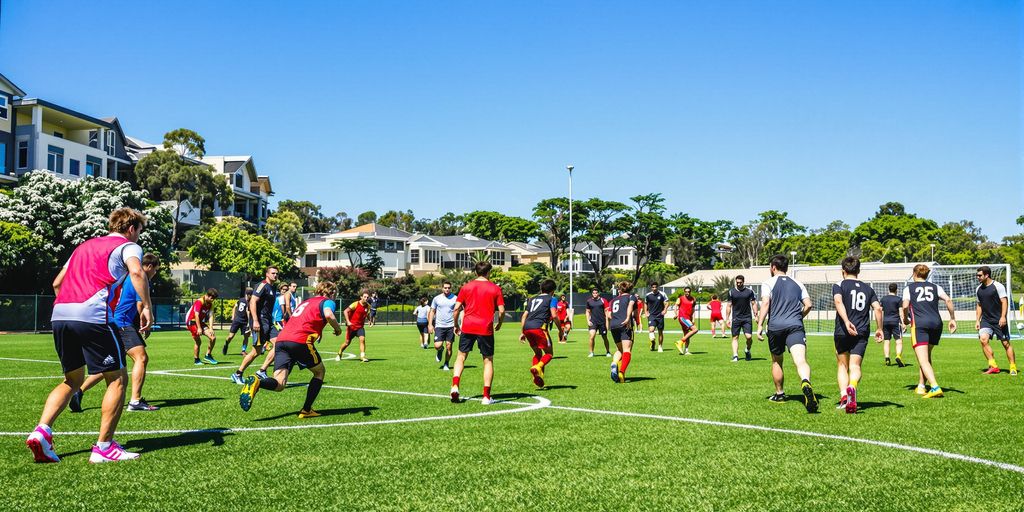Nurturing Young Talent Through Structured Programmes

Importance of Early Development
Getting kids involved early is massive. It’s like planting a seed – the sooner you start, the better the roots. Early development programmes give young players a head start, teaching them the basics and instilling a love for the game. It’s not just about skills; it’s about building confidence and teamwork from the get-go.
Tailored Training Regimens
One size doesn’t fit all, especially when it comes to training. Tailored training regimens are all about understanding each player’s strengths and weaknesses. It’s about creating a plan that helps them improve in specific areas, whether it’s their passing, shooting, or defending.
- Individualised assessments
- Specific skill drills
- Performance tracking
Tailored training is not just about improving skills; it’s about fostering a love for the game and helping each player reach their full potential. It’s about creating an environment where they feel supported and challenged, and where they can grow both as players and as people.
Exposure to Competitive Environments
You can’t learn to swim without getting in the water, right? Same goes for footy. Exposure to competitive environments is crucial for young players. It’s where they learn to handle pressure, make quick decisions, and work as a team under stress. It’s about putting their skills to the test and seeing how they stack up against other talented players.
Here’s a quick look at the benefits:
| Benefit | Description |
|---|---|
| Skill Development | Refines skills under pressure. |
| Tactical Awareness | Improves decision-making in game situations. |
| Mental Toughness | Builds resilience and the ability to handle setbacks. |
The Impact of Professional Coaching
Qualified Coaches and Their Role
Having good coaches is super important for young players. They’re not just teaching skills; they’re shaping futures. It’s about having people who know the game inside and out, but also understand how to work with young athletes. They need the right qualifications, of course, but also the ability to communicate well and create a positive learning environment. It’s a big responsibility, and it makes a huge difference.
Mentorship Opportunities
It’s not just about drills and tactics. Mentorship is a massive part of what good coaches bring to the table. It’s about guiding young players, helping them navigate challenges, and providing support both on and off the field. A good mentor can help a young player develop confidence, resilience, and a strong work ethic. It’s about building character as much as it is about building skills.
Building a Supportive Network
Coaches play a big role in creating a supportive network for young players. This includes:
- Connecting players with other resources, like sports psychologists or nutritionists.
- Facilitating communication between players, parents, and other stakeholders.
- Creating a team environment where players feel valued and supported.
A supportive network can make all the difference for a young player. It provides a sense of belonging, helps them cope with pressure, and encourages them to reach their full potential. It’s about creating a community around the sport.
It’s about more than just the game; it’s about building a community. Coaches who can do that are worth their weight in gold. It’s also important to teach humanistic coaching to enhance positive developmental outcomes.
Creating Pathways to Professional Football
Transitioning from Youth to Senior Levels
Making the jump from youth footy to the big leagues is a massive step. It’s not just about being good at the sport; it’s about adapting to a whole new level of intensity and professionalism. The transition requires a shift in mindset, training, and overall commitment. You’ve got to be ready to handle the pressure, the increased competition, and the demands on your time. It’s a tough gig, but with the right support and dedication, it’s totally achievable.
Success Stories of Alumni
It’s always inspiring to hear about players who’ve come through the ranks and made it to the top. These success stories show that the pathway is there, and it’s possible to achieve your dreams with hard work and the right opportunities. Take, for example, young Matilda, who went from our youth academy straight into the national team. Or there’s young Jed, who is now playing in Europe. These are just a couple of examples of what can be achieved with dedication and the right support. Their journeys highlight the importance of a strong foundation and the opportunities that exist for talented young players.
Collaboration with Professional Clubs
Working closely with professional clubs is a game-changer for our young players. It opens doors to training opportunities, mentorship programmes, and even potential contracts. These partnerships give our players a taste of what it’s like to be part of a professional setup, and it helps them develop the skills and mindset they need to succeed at the highest level. It’s a win-win situation for everyone involved.
Having strong connections with professional clubs is vital for creating clear pathways for our young players. It provides them with invaluable experience and exposure, helping them to bridge the gap between youth and senior football. This collaboration ensures that our players are well-prepared for the challenges of professional football and have the best possible chance of achieving their goals.
Here’s a quick look at some of the benefits of these collaborations:
- Access to professional training facilities
- Opportunities to train with senior players
- Mentorship from experienced coaches
- Potential for trial periods and contracts
Strength and Conditioning for Young Athletes
Physical Preparedness for Competition
Getting young athletes ready for the demands of competition is more than just running laps. It’s about building a solid base of strength and endurance. We need to make sure they’re physically up to the challenge. This means structured training programmes that consider their age, development stage, and the specific requirements of their sport. It’s not a one-size-fits-all approach; it’s about tailoring the training to the individual.
Injury Prevention Strategies
Keeping young athletes on the field is just as important as improving their performance. Injury prevention is a massive part of strength and conditioning. We’re talking about:
- Proper warm-up and cool-down routines
- Focus on flexibility and mobility
- Strength training to support joints and muscles
It’s about teaching them how to move correctly, how to listen to their bodies, and how to avoid pushing themselves too hard, too soon. Early intervention is key.
Long-Term Athletic Development
It’s not just about winning today; it’s about setting them up for a long and successful career. Long-term athletic development is about building a foundation of skills and physical attributes that will serve them well into the future. This includes:
- Developing fundamental movement skills
- Progressive overload in training 6-week programme
- Focus on overall athleticism, not just sport-specific skills
It’s a marathon, not a sprint. We want to see these young athletes reach their full potential, and that takes time, patience, and a well-thought-out plan. It’s about building an AFL-ready body, and that takes time. It’s also about early physical development.
Community Engagement and Grassroots Initiatives
Building Local Football Communities
Getting more people involved at the local level is super important. It’s about making sure everyone feels welcome and has a chance to play, no matter their skill level. Local clubs are the heart of football in Australia, and we need to support them. Think about it: more local games, more local heroes, and a stronger sense of community. It’s not just about the sport; it’s about bringing people together. We can do this by:
- Running more come-and-try days.
- Offering beginner programmes for all ages.
- Making sure facilities are up to scratch.
Volunteer Programmes for Youth
Volunteers are the backbone of grassroots footy. Without them, nothing would happen. We need to get more young people involved in volunteering, not just playing. It gives them a different perspective on the game and helps them develop leadership skills. Plus, it looks great on a resume! We could set up specific youth volunteer programmes that focus on:
- Coaching younger age groups.
- Helping with game day setup and pack down.
- Running social media for the club.
Promoting Inclusivity in Football
Footy should be for everyone, regardless of their background, gender, or ability. We need to actively promote inclusivity at all levels. This means creating a safe and welcoming environment for all players and supporters. It’s about making sure everyone feels like they belong. Some ideas to make this happen:
- Running targeted programmes for underrepresented groups.
- Providing diversity and inclusion training for coaches and volunteers.
- Celebrating different cultures within the football community.
It’s about more than just kicking a ball around; it’s about building a community where everyone feels valued and respected. By focusing on these initiatives, we can make sure that football in Australia is truly a sport for all.
Innovative Training Techniques and Technologies

These days, it’s not just about running laps and kicking a ball. We’re seeing some seriously cool stuff happening with how young footballers are being trained. It’s all about getting smarter, not just working harder.
Utilising Data Analytics in Training
Data is king, right? Well, it’s becoming a big deal in footy too. We’re talking about tracking everything from player movement to heart rate, then using that info to make training more effective. Coaches can now see exactly where players excel and where they need to improve. It’s like having a GPS for your game.
- Analysing player performance metrics to identify strengths and weaknesses.
- Using data to tailor training drills to individual needs.
- Tracking player fatigue levels to prevent overtraining.
Incorporating Modern Training Tools
Forget cones and whistles – although they’re still important! Now we’ve got GPS trackers, virtual reality, and fancy software. These tools help players visualise plays, improve reaction times, and even train remotely. It’s like something out of a sci-fi movie, but it’s real, and it’s helping our young athletes get better, faster. For example, Melbourne Knights confirm innovative alliance with ProTrainUp.
- Virtual reality simulations for tactical decision-making.
- Wearable technology to monitor player biometrics.
- Specialised apps for skill development and performance tracking.
Feedback Mechanisms for Continuous Improvement
It’s not enough to just train; you need to know if it’s working. That’s where feedback comes in. We’re talking about video analysis, coach evaluations, and even player self-assessment. The goal is to create a culture of continuous improvement, where everyone is always looking for ways to get better.
The key is to make feedback timely, specific, and actionable. Players need to understand what they’re doing well and what they need to work on, and they need the tools and support to make those improvements. It’s about creating a growth mindset, where players see challenges as opportunities to learn and develop.
- Regular video analysis sessions to review performance.
- One-on-one meetings with coaches to discuss progress.
- Peer feedback sessions to encourage collaboration and learning.
The Role of Academies in Skill Development
Academies play a massive part in shaping young footy players. It’s where raw talent gets refined, and potential is turned into skill. They’re not just about drills; they’re about building a complete player.
Specialised Skill Training Programmes
Academies offer programmes that go way beyond your average training session. We’re talking about specialised coaching tailored to specific positions and skill sets. Think intensive sessions on kicking accuracy, tackling techniques, and reading the play. It’s about breaking down the game into its smallest parts and mastering each one. These programmes often use video analysis and one-on-one coaching to really drill down on individual weaknesses and strengths. It’s not a one-size-fits-all approach; it’s about customising the training to the player.
Focus on Technical and Tactical Skills
It’s not just about being able to kick a ball really far; it’s about knowing when and where to kick it. Academies put a big emphasis on the technical side of the game – ball handling, kicking techniques, and marking skills. But they also focus on the tactical side – understanding game plans, reading opponents, and making smart decisions under pressure. This combination of technical and tactical skills is what separates good players from great players.
Creating a Competitive Edge
Academies are designed to push players to their limits. They create a competitive environment where players are constantly challenged to improve. This could involve regular scrimmages against other academies, participation in tournaments, and individual performance targets. The goal is to prepare players for the intensity and pressure of professional footy. It’s about instilling a winning mentality and a relentless drive to succeed.
Academies are more than just training grounds; they’re incubators for future stars. They provide the resources, coaching, and competitive environment needed to develop young talent and prepare them for the next level. It’s a holistic approach that focuses on not just skill development, but also character building and personal growth.
Empowering Young Leaders in Football
Youth Leadership Programmes
It’s not just about kicking a ball around; it’s about shaping the next generation of leaders, right? The Australian Youth Football Institute is starting to put a real focus on youth leadership. We’re talking about programmes designed to give young players the skills they need to lead, both on and off the field. Think workshops on communication, decision-making, and even conflict resolution. It’s about more than just being a good player; it’s about being a good person and a role model. Football Australia is launching a "Step Up" programme in 2025, a 12-month development programme for young leaders.
Encouraging Volunteerism
Getting young people involved in volunteerism is a massive win-win. It not only helps the football community but also teaches these kids some seriously important life lessons. We’re talking about things like responsibility, teamwork, and giving back. Plus, it looks great on a resume! The Institute is actively encouraging young players to get involved in coaching younger age groups, helping out at local matches, or even just assisting with administrative tasks. It’s all about fostering a sense of community and showing them that football is more than just a game.
Developing Life Skills Through Sport
Sport, and football in particular, is a fantastic way to develop life skills. It’s not just about physical fitness; it’s about mental toughness, resilience, and the ability to work as part of a team. The Institute recognises this and is actively incorporating life skills training into its programmes. This includes things like goal setting, time management, and dealing with pressure. These are skills that will benefit these young players long after they’ve hung up their boots.
The Institute is working to create a culture where young players are not only skilled footballers but also well-rounded individuals who are prepared for the challenges of life. It’s about building character and instilling values that will serve them well, no matter what path they choose.
Here’s a quick look at some of the life skills we’re focusing on:
- Teamwork
- Communication
- Problem-solving
- Resilience
Partnerships with Educational Institutions
Integrating Football with Education
It’s not just about what happens on the pitch; what happens in the classroom matters too. We reckon that integrating football with education is a smart move. It helps young players develop into well-rounded individuals. We’re talking about creating a system where training schedules and academic commitments work together, not against each other. This means flexible timetables, support for catching up on missed work, and a general understanding from schools about the demands of youth football.
Scholarship Opportunities for Talented Players
Scholarships can be a game-changer. They provide a pathway for talented young players, especially those from less privileged backgrounds, to access quality education and football training. It’s about recognising potential and giving these kids a fair go. These scholarship opportunities can cover tuition fees, accommodation, and even equipment costs, removing financial barriers that might otherwise prevent them from pursuing their dreams.
Here’s what a scholarship programme might look like:
- Academic support and tutoring.
- Access to top-notch training facilities.
- Mentorship from experienced coaches and educators.
Collaborative Programmes with Schools
Working hand-in-hand with schools is key. We’re talking about setting up programmes that benefit both the students and the football institute. This could involve coaches running training sessions at schools, or schools incorporating football-related activities into their curriculum. It’s about creating a win-win situation where students get more opportunities to be active and develop their skills, while the institute gets to scout for new talent and build stronger ties with the local community.
By teaming up with schools, we can create a supportive environment where young players can thrive both academically and athletically. It’s about building a future where success on the field goes hand-in-hand with success in the classroom.
Promoting Diversity and Inclusion in Football
Football, like any sport, should be for everyone. It’s about making sure that no matter where you come from, what you believe, or how you identify, you’ve got a fair go on the pitch. It’s not just a nice thing to do; it actually makes the sport better. More perspectives mean more creativity, more resilience, and a stronger community all around.
Encouraging Participation from All Backgrounds
We need to actively encourage kids from all walks of life to get involved. This means reaching out to communities that might not traditionally engage with football, breaking down barriers like cost or transport, and making sure everyone feels welcome. It’s about showing that football is a sport for all Australians, not just some. For example, offering scholarship opportunities can help remove financial barriers.
Programmes for Underrepresented Groups
Specific programmes can make a real difference. Think targeted coaching for girls, initiatives to support Indigenous players, or creating pathways for people with disabilities. These aren’t just about ticking boxes; they’re about giving everyone the chance to shine. These programmes need to be well-funded and properly supported to have a lasting impact.
Creating Safe Spaces for Young Players
It’s vital that every young player feels safe and respected, regardless of their background. This means tackling discrimination head-on, promoting positive role models, and creating a culture of inclusivity. We need to train coaches and officials to recognise and address issues like bullying or prejudice. A safe environment is a positive environment for growth.
Creating a truly inclusive environment requires ongoing effort and commitment. It’s not enough to simply say we’re inclusive; we need to actively demonstrate it through our actions and policies. This means listening to the voices of underrepresented groups, addressing their concerns, and working together to build a better future for football in Australia.
Here’s a simple breakdown of how we can measure our progress:
- Increased participation rates from diverse backgrounds
- Positive feedback from players and families
- Reduced incidents of discrimination
The Future of Football in Australia
Vision for Youth Development
Okay, so what’s the big picture for footy here? It’s all about getting more kids involved and making sure they have the best chance to grow. We’re talking about a system where every young player, no matter where they are, gets access to quality coaching and facilities. It’s about building a sustainable future, not just chasing quick wins. The goal is to see more Aussies playing at the highest levels, both here and overseas. It’s a long game, but one worth playing. Football Queensland is aiming for six-figure participants by 2026, which is a great start.
Adapting to Global Trends
Football isn’t played in a bubble. We need to keep an eye on what’s happening around the world and learn from the best. That means looking at how other countries are developing their youth players, what kind of training methods they’re using, and how they’re using technology. We can’t just stick to what we’ve always done; we need to be open to new ideas and ways of doing things. It’s about staying competitive on the world stage.
- Embracing data analytics to improve player performance.
- Adopting innovative training techniques.
- Focusing on player well-being and mental health.
The future of Australian football hinges on our ability to adapt and innovate. We need to be proactive in identifying and implementing best practises from around the globe, while also staying true to our unique Australian identity.
Sustainability in Football Development
This isn’t just about finding the next big star; it’s about building a system that lasts. That means investing in grassroots programmes, training more coaches, and making sure clubs have the resources they need to support young players. It’s also about making football accessible to everyone, regardless of their background or financial situation. We need to think long-term and create a sustainable model for football development that benefits everyone involved. The Emerging Matildas Championships and Emerging Socceroos Championships are a step in the right direction.
| Area | Goal |
|---|---|
| Grassroots | Increased participation rates |
| Coaching | More qualified and experienced coaches |
| Accessibility | Football for all |
Looking Ahead: The Future of Youth Football in Australia
In wrapping things up, it’s clear that the Australian Youth Football Institute is doing some solid work in shaping the future of young players. They’re not just about kicking a ball; they’re about building skills, confidence, and pathways for these kids. With programmes that focus on everything from physical training to personal development, they’re setting up the next generation for success both on and off the field. As we look forward, it’s exciting to think about how these young talents will evolve and contribute to the game. The future of Aussie football is bright, and it’s all thanks to the hard work being put in today.




